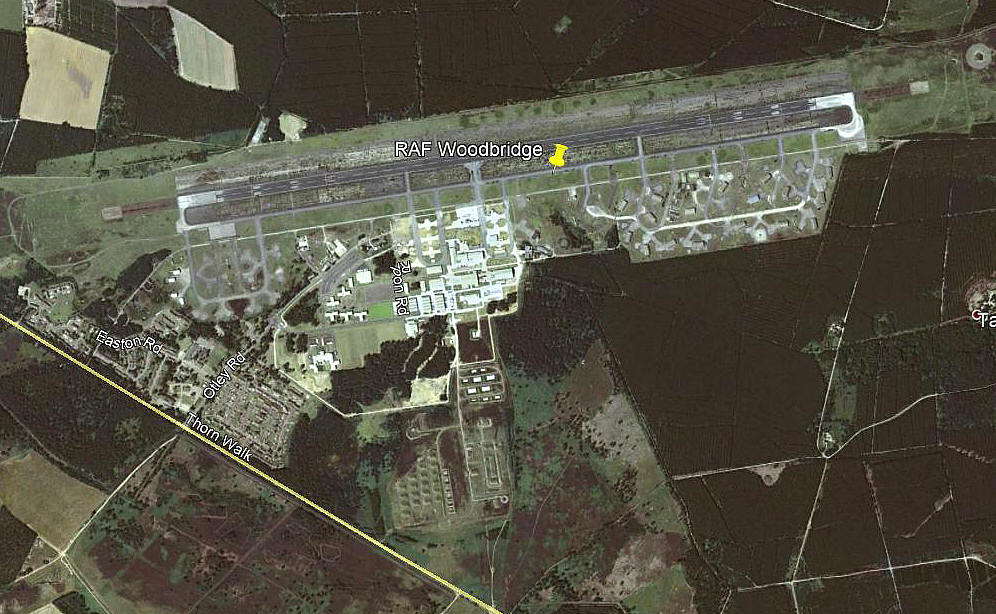Woodbridge
WOODBRIDGE: Military aerodrome
Note: Initially known as RAF SUTTON HEATH
Note: This picture was obtained from Google Earth 2007.
Military users: WW2: RAF Bomber Command 3 Group
Used as an emergency landing ground during WW2 at least
Bomb Ballistic Unit (MAP Unit, Handley Page Halifaxs & DH Mosquitos)
1960s: USAF 20th Tactical Fighter Wing
79 Sqdn (Republic F-84G Thunderjet, later F-84F Thunderstreak)
1975: USAF (McDonnell Douglas F-4D Phantoms, Sikorsky HH-53 Jolly Green Giants & Lockheed HC-130N Hercules)
1980s: USAFE 67 SOS (Lockheed HC-130N & HC-130P Hercules)
78 & 91 TFS (Fairchild Republic A.10A Thunderbolts)
21 SOS (Sikorsky MH-53J Super Jolly Green Giants)
Location: E of B1083, 2.5nm SSW of BENTWATERS, 10nm ENE of Ipswich
Period of operation: 1941 to 1946. Reopened 1952 to present day (?)
Runway: WW2: Emergency runway with a surface comprised of bitumen and sand
1944: 09/27 2743x247 (with 457 metre grass extensions at each end)
NOTES: This was a massive runway in it’s day but, even when adding the grass extensions still falls short of the grass runway at RAF WITTERING in length, (which I still have doubts about).
In 1943 three Emergency Landing Grounds were established, the others being at CARNABY in YORKSHIRE and MANSTON in KENT. At WOODBRIDGE at least, three 'Lanes' were available, the third and southern 'Lane' for use by aircraft that had lost their radio communications.
It appears that in WW2 4,200 aircraft, both RAF and USAAF made use of this facility, which was equipped with FIDO, the fog dispersal system where two trenches, either side of the runway were filled with petrol and set alight, creating enough heat to lift and disperse the fog.
I cannot seem to find exact information, but suspect that the hard runway was laid down in around 1951/52 ready for the USAF to move in with their jets.
DH SWALLOW
It seems that some of the initial test flying of the de Havilland DH108 Swallow was undertaken here, no doubt because of the runway length. The DH108 was the first British swept-wing jet and first British jet of 'tail-less' design, albeit it did have a fin and rudder. The three high-speed prototypes (there was also a low-speed version) were all lost in fatal accidents, the first occurring to TG306 on the 27th September 1946, when, at the bottom of a high speed dive it broke up in mid-air killing de Havilland’s son, Geoffrey de Havilland Jnr.
The DH108 (VW120) did break one World Air Speed Record, at 604.98mph on the 12th April 1948 over a 100km circuit. A Gloster Meteor still held the slightly higher straight-line record at 616mph. It is thought that John Derry might have been the first to break the ‘sound- barrier’ – Mach 1, at high altitude in a dive. John Derry and his observer Anthony Richards were later killed in another de Havilland type, a DH.110 prototype (WG236) on the 6th September 1952 at the FARNBOROUGH Air Show (see HAMPSHIRE), just after breaking the ‘sound-barrier’ for the crowds.
We'd love to hear from you, so please scroll down to leave a comment!
Leave a comment ...
Copyright (c) UK Airfield Guide
















